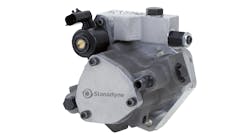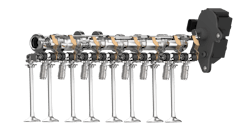The U.S. Copyright Office is about as low a profile federal agency as one can imagine. In 35 years of covering Washington for about 50 trade and professional magazines in many different sectors, I have never written anything about the office. I didn't even know it existed.
That all changed when the office raised its head on a controversial issue, in this case software enabled consumer products, such as the electronic control units (ECUs) in automobiles. The issue came to surface quickly when the Electronic Freedom Foundation (EFF) filed a request for an exemption from the Digital Millennium Copyright Act's prohibition on circumvention of copyrights for consumer products.
| FREE TELEMATICS WHITEPAPER From The Commitment to Training | |
|
Stay ahead of the industry and expand your technical automotive knowledge by downloading our free whitepaper. |
|
The Copyright Office is part of the Library of Congress. It reviews certain sections of the copyright law every three years. It was about to undertake a review of section 1201, which encompasses the DMCA's provisions that have been cited by auto manufacturers as allowing them to sue third parties for copyright infringement.
The Librarian of Congress granted the EFF an exemption from section 1201 liability in October 2015, but only for do-it-yourselfers, not third parties, such as independent service stations and parts manufacturers. One week after the Librarian of Congress issued the exemption the two top senators on the Senate Judiciary Committee sent a letter to the Register of Copyrights asking her to conduct a study of the role copyright law plays in defining how software-enabled products can be used. Two studies are now being prepared, and comments from industry are pouring in.
Aaron Lowe, senior vice president, Regulatory and Government Affairs, Auto Care Association, says, "The issue went viral for us after the Library of Congress issued its decision last October. We couldn't understand how the exemption did not extend to third parties." Lowe said that the reports will be issued later this year, and will lead to legislative discussion next year.
The problem for aftermarket players is that original equipment manufacturers increasingly use firmware and software to control the function and operation of motor vehicle parts. Engines, transmissions, oxygen sensors, ignitions, brakes, emissions systems, electric windows, air blowers, air bags and even windshield wipers are a few of the systems in which manufacturers have replaced purely electro-mechanical parts with microprocessors and software controls embedded in ECUs.
Groups such as the Auto Care Association are awaiting the two copyright office reports before formulating a legislative strategy, which will be deployed next year in the next Congress. There are a couple of germane bills in Congress now bearing on software ownership that have not moved forward in part because their sponsors are waiting for these two Copyright Office studies to be completed, and to be able to use them as political ammunition.
One bill is called Breaking Down Barriers to Innovation Act of 2015 (S. 990/H.R. 1883). This bill would essentially nullify the argument auto manufacturers have made that auto purchasers are only leasing the software in their cars, and since they don't own that software neither they nor the service stations they might take that car to for repair can have access to the proprietary tools the manufacturers use to test the electronic control units in automobiles.
Another bill, sponsored by Rep. Blake Farenthold (R-TX), is called the You Own Devices Act (H.R. 862) (YODA) and would allow the transfer of ownership of a copy of a computer program embedded on a machine or other product “if [the] computer program enables any part of [that] machine or other product to operate,” as well as any right to receive software updates or security patches from the manufacturer. This right of transfer could not be waived by any contractual agreement.
Lowe explains that none of the current bills do exactly what the Auto Care Association thinks needs to be done. Whatever that is, one thing is for sure: the auto manufacturers, backed up by the U.S. Chamber of Commerce and groups such as the Software and Information Industry Association, will be fighting to retain the right to sue aftermarket players.
Subscribe to Aftermarket Business World and receive articles like this every month….absolutely free. Click here.



